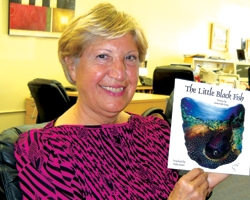Ruby Emam doesn’t have to think twice when asked why she chose to emigrate from her native Iran to the United States.
“Doesn’t everyone in the world want to live here? She says. “We are free here to say and live the way we want.”
She has lived in the United States for about the last 17 years, but also spent time in the country earlier in her life.
Emam, 65, has been a resident of Seal Beach Leisure World for about five and a half years. She grew up in Azerbaijan, in northern Iran, where much of the culture’s traditions came from Turkey. She lived there until the age of 18, when she moved to the Tehran to attend the main university and continue an extensive education.
Emam said she has seen the exhilaration of revolution over a corrupt regime in her native land, only for it to be replaced by the horrors of tyranny under a theocracy.
“The Shah was corrupt and we were all excited about the possibility for change,” she said. “We did not know that it would become worse under the government that is there now.”
A former fashion model in France, she has felt the sting of being forced to wear the hijab (a headscarf and dull black dress) in public at all times.
A world traveler, she studied the English and French languages and made a good living as a translator for the Iranian government for some time.
When Emam was about 35 years old, she was told that her 22-year-old sister Parvaneh Eman had been arrested.
Emam’s sister, who had become involved with activists who were outspoken about the need to be free to make their own decisions apart from the dictates of the theocracy, was tried and found guilty of being a warrior against God.
“They executed her,” Emam said.
Although Emam was unable to help her sister, she said she was recently able to honor her sister’s memory and in the process she hopes she has helped to do her part to advance the cause of freedom.
Samad Beh-Rang is the Iranian author of a so-called children’s book titled “The Little Black Fish.”
Emam has helped promote the story by translating it into English and working to promote its distribution. The book, in its translated form, is dedicated “To the memory of my sister Parvaneh Emam.”
According to notes on the book:
“The Little Black Fish” is about a Little Black Fish who, dissatisfied with a life without any aspiration or purpose, embarks on an eye-opening journey with the spirit of a dreamer experiencing an awakening and the prospects of the deeds he would perform.
“The story of The Little Black Fish with its political undertone is a revelation, not just an experience. It is about stepping outside the confines of a self-centered life, drawing a distinction between the wandering and the stationary,” Emam said.
Emam said her reward in translating and getting the book published is part of her own desire to complete the circle of life in a way that “pays it forward” and sets an example in “a small way” about having the integrity to stand up for social justice.
There exists in the story of “The Little Black Fish.”
Emam explained that the author of the book, although a children’s story, remains banned her native Iran.
Samad Beh-Rang, who grew up in poverty, lived from 1939-1968. Despite that, he was able to scratch away at his personal challenges.
He got an education and became a teacher. He would travel to far-flung areas of Iran tobring books and knowledge, where he could, to those who might have nothing to enlighten their lives.
“Like my sister, they killed him too,” Emam said. “It is interesting to note that his body was found in the same river that he wrote that the little black fish began his journey.”
Emam said she sees her translation of the book to English as a small contribution to the cause of individual freedom she said has made her adopted home of the United States great.
“English is the universal language,” she said. “I hope the (translated) story helps spread understanding and gives people the strength to sand up to things.”
Now that her “The Little Black Fish” project has its own momentum, Emam said she is working on translating another book with similar symbolic imagery.
To find out more about Emam’s translation of “The Little Black Fish,” see the Web site at: amazon.com/Little-Black-Classics-Persian-Literature.












